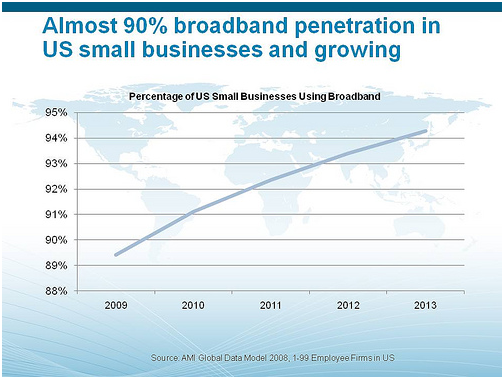If, as many argue, broadband and economic growth are correlated (we might have more debate about whether the relationship is causal, or not), then lagging adoption of broadband might be presumed to be bad for economic growth.
A huge percentage of small businesses apparently do not have their own websites, a study by e-mail services supplier E-mail Brokers suggests.
On the other hand, it appears business purchasing of high-speed access is quite high.
According to recent studies of broadband adoption in Europe, it would not be at all unusual for well over 85 percent of businesses with at least five employees to be using broadband.
Even as early as 2008, for example, 93 percent of enterprises in the United Kingdom with 10 or more employees used the Internet, while more than 87 percent of U.K. enterprises had a broadband connection. Granted, small business adoption and enterprise adoption, are different matters.

But similar studies in the U.S. market suggest that most small businesses are buying and using broadband. In fact, according to AMI Partners, small and medium-sized business broadband penetration is already almost 90 percent, and despite the recession is expected to grow to almost 95 percent by 2013.
So we have a bit of a conundrum. On one hand, it appears most small businesses use broadband. Far fewer presumably operate their own websites, especially those equipped for e-commerce.
Is that a problem? While it would be understandable that suppliers of marketing services would argue there is an issue, others might disagree.
Presumably small business owners have a business logic for buying broadband access. Perhaps not all smaller businesses have as compelling a belief that a website provides such clear value that it is a priority “right now.” Perhaps there is more universal acknowledgement that, ”we need e-mail access” and “the ability to surf the Web,” or “accept credit card and debit card payments.”
Maybe the value of a branded website is not deemed so important. That might be especially true for franchisees, who can assume the franchising brand will create and support such sites. In other cases, a small business might well decide a presence on Yelp or Google Plus is sufficient.
The issue is not “use of the Internet,” since small businesses in Europe and the United States do so at high levels. The more precise question is whether a branded website is a top priority for a small business, compared to other uses of operating capital.
Edited by
Brooke Neuman